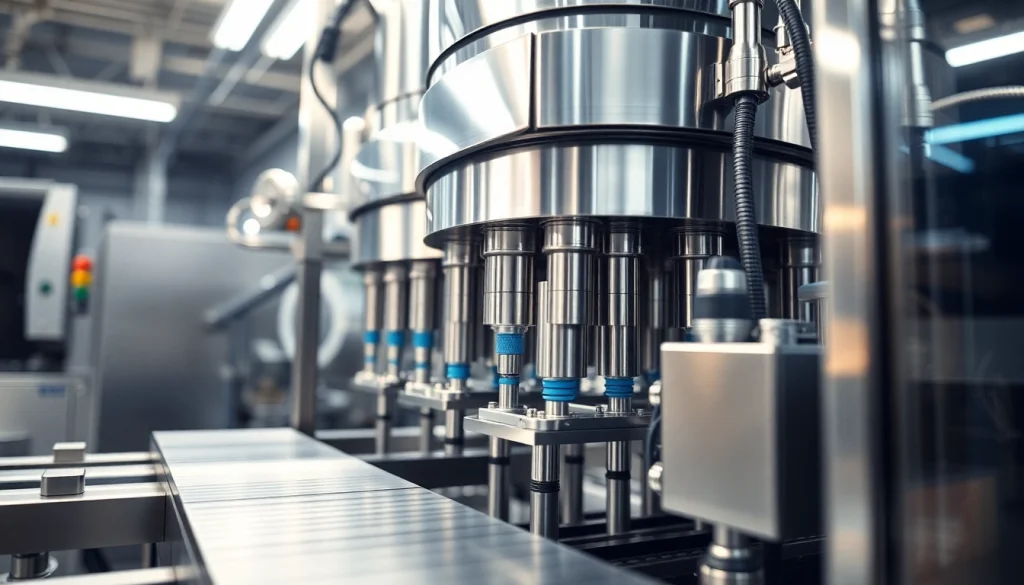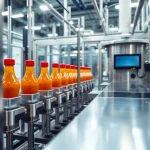Understanding the Role of Filling Machines in Industry
Filling machines are vital components in the production and packaging sectors, providing the necessary functionality for accurately dispensing liquids, powders, and granulated products into containers. These machines not only ensure operational efficiency but also enhance product consistency, meeting the stringent requirements of various industries. A reliable Filling Machine Supplier can significantly affect the quality of production lines, making it essential to understand their roles thoroughly.
The Importance of Quality Filling Equipment
The significance of high-quality filling equipment cannot be overstated. Quality filling machines enhance packaging efficiency and improve the product’s shelf life by minimizing contamination and ensuring proper sealing. Moreover, the choice of filling equipment often directly influences operating costs. Higher-quality machines typically have lower maintenance and operational expenses due to their durability and reliability.
Types of Filling Machines Available
Filling machines come in various types, each designed to cater to specific product forms and packaging requirements:
- Gravity Fillers: Ideal for free-flowing liquids, gravity fillers rely on the gravitational pull to dispense the product into containers. They are commonly used in bottling plants, especially for beverages.
- Piston Fillers: These machines are used for thicker liquids or products with particulates. A piston filler utilizes a piston mechanism to draw and dispense liquid, ensuring precise measurements.
- Vacuum Fillers: As the name suggests, vacuum fillers use a vacuum to pull the product into the container, thereby eliminating air pockets and ensuring consistent fills.
- Auger Fillers: Typically employed for powders or granulated materials, auger fillers use a rotating screw mechanism to measure and dispense the product accurately.
- Overflow Fillers: Utilized for beverages and similar liquids, overflow fillers ensure that all containers are filled to the same level, enhancing product uniformity.
Applications Across Different Sectors
The versatility of filling machines enables their use across various sectors, including:
- Food and Beverage: Filling machines are essential in bottling liquids, jars, and ready-to-eat meals.
- Pharmaceutical: Accurate dosing of medicines and supplements relies heavily on specialized filling machines designed for regulatory compliance.
- Cosmetics: Filling machines handle delicate formulations in cosmetic products, ensuring no contamination.
- Chemicals: Hazardous materials require machines designed with safety features to prevent spillage and contamination.
Choosing the Right Filling Machine Supplier
Selecting the right filling machine supplier can be a daunting task. To ensure you make an informed decision, consider the following criteria:
Key Factors to Consider
When searching for a filling machine supplier, focus on the following:
- Industry Experience: A supplier with extensive experience in your specific industry can provide valuable insights and tailored solutions.
- Technological Expertise: Evaluating how advanced the supplier’s technology is can give you an advantage in efficiency and product quality.
- Customization Options: A good supplier should offer options to customize machines based on specific packaging needs.
- Cost: Compare the total cost of ownership, including initial investment, maintenance, and operational costs.
- Client Portfolio: Assessing the clientele and case studies can indicate the supplier’s trustworthiness and capability.
Evaluating Supplier Reputation and Experience
The reputation of a filling machine supplier can often be gauged through customer testimonials, industry awards, and online reviews. Engaging with other businesses or forums can provide firsthand feedback on supplier performance. Certifications and standards compliance are also important indicators of a supplier’s reliability.
Customer Support and After-Sales Services
Exceptional customer support is crucial for the longevity of your filling machine. A supplier should provide comprehensive after-sales services, including installation, maintenance support, and prompt response to any issues. An efficient support system can minimize downtime and maintain production flow.
Innovations in Filling Machine Technology
The filling machine industry is continuously evolving, with new technologies enhancing efficiency, accuracy, and sustainability.
Automation and Efficiency Enhancements
The advent of automation in filling machines has transformed operations significantly. Automated filling systems can operate at high speeds, significantly reducing labor costs and increasing productivity. They are especially beneficial for high-volume production environments, where consistent fill levels are necessary for maintaining quality standards.
Smart Technology Integration
Smart technologies are being integrated into filling machines to provide real-time monitoring and data analytics. Sensors can track production speeds, fill levels, and machine performance, generating data that can be analyzed to optimize operations. The implementation of IoT (Internet of Things) technologies allows for remote monitoring, ensuring machines operate at peak performance.
Sustainability Practices in Filling Solutions
In an era of increasing environmental consciousness, sustainable practices in manufacturing are more important than ever. Many filling machine suppliers are integrating eco-friendly materials and energy-efficient designs. Companies are now opting for equipment that reduces waste and energy consumption, aligning their operations with global sustainability goals.
Common Challenges in Filling Machine Operations
Maintenance and Downtime Concerns
One of the main challenges of operating filling machines is maintaining consistent performance with minimal downtime. Downtime can result from mechanical failures, improper settings, or lack of maintenance. Implementing a proactive maintenance schedule and training staff on proper machine operation can mitigate these issues.
Addressing Product Variability Issues
Product variability can lead to inconsistencies in fill levels, affecting product quality and customer satisfaction. Regular calibration of machines and using standardized processes can help minimize this variability. Additionally, employing high-quality raw materials can help maintain consistency across batches.
Regulatory Compliance Factors
Compliance with industry regulations is essential, particularly in sectors like pharmaceuticals and food and beverage. It is vital for filling machine suppliers to remain updated on local and international regulations to ensure their equipment meets all safety and quality standards. Regular audits and inspections should be scheduled to ensure that operational practices align with compliance requirements.
Maximizing Performance with Your Filling Machine
To gain the most from your investment in filling machines, consider the following best practices:
Best Practices for Operation
Effective operation of filling machinery requires adherence to best practices, such as maintaining clean environments, regularly checking for leaks, and training staff adequately. Clear operational manuals should be provided to ensure workers understand how to operate machines efficiently.
Training Staff for Optimal Use
Investing in employee training can significantly enhance the functionality and longevity of filling machines. Training programs should cover machine operation, troubleshooting techniques, maintenance schedules, and safety protocols. Engaging employees in regular refresher courses and workshops can keep their skills sharp.
Tracking and Measuring Success Indicators
Establishing key performance indicators (KPIs) helps in measuring the efficiency of filling operations. Metrics such as production output, downtime, waste percentage, and product quality should be tracked to continuously improve processes and equipment efficiency. With accurate data collection and analysis, adjustments can be made to optimize overall performance.


